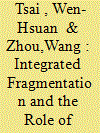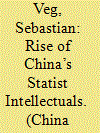| Srl | Item |
| 1 |
ID:
169198


|
|
|
|
|
| Summary/Abstract |
The 2008 Sichuan earthquake was one of the deadliest natural disasters in China’s recent history, and it inspired unprecedented activism in China. This article shows that one important yet overlooked path to the development of new NGOs in Sichuan was a massive transfer of resources and personnel from other provincial governments. Pairing richer provinces with poorer ones to spur development was already a PRC practice and was immediately implemented when the earthquake struck; transferred officials with experience working with NGOs in their own provinces brought such NGOs with them, helped to create new organizations in Sichuan, and facilitated cooperation between local officials and NGO activists—a scenario neglected in earlier studies. The disaster provided an opportunity for local governments in Sichuan to learn how to outsource social service programs to cooperative NGOs, in line with recent policy elsewhere in China.
|
|
|
|
|
|
|
|
|
|
|
|
|
|
|
|
| 2 |
ID:
169197


|
|
|
|
|
| Summary/Abstract |
Drawing on evidence from semistructured interviews and an original survey, this article examines the policy influence of Provincial People’s Congress deputies and reveals how deputies who lack substantial power enhance their influence. Deputies mainly use two types of strategies: improving the persuasiveness of policy suggestions, which includes gathering information and providing specific and feasible solutions, and strengthening interactions with other political actors, through face-to-face persuasion, pressuring relevant departments, gaining support from congress leaders, and seeking support from public opinion. The article demonstrates how such strategies help some of the deputies make a difference in China’s policy-making process.
|
|
|
|
|
|
|
|
|
|
|
|
|
|
|
|
| 3 |
ID:
169200


|
|
|
|
|
| Summary/Abstract |
Shaped by a host of antecedent factors, the Umbrella Movement in 2014 gave rise to a new political consciousness in Hong Kong’s civil society. The term “Umbrella Generation” has been widely used in the wake of the political struggle. This article takes the movement as a pivotal case study of the formation of a new political generation through the intersection of sociodemographic, political, and cultural changes. This entailed not only antistate opposition by citizens of that generation but also a process of generational change mediated by various contending forces. Considering both inter- and intragenerational dynamics, this article integrates the insights of generational theory with a cultural analysis of discourse and dramaturgy—the umbrella protests as street theater—as well as a political analysis of agency, conflict, and leadership shifts.
|
|
|
|
|
|
|
|
|
|
|
|
|
|
|
|
| 4 |
ID:
169195


|
|
|
|
|
| Summary/Abstract |
How are bureaucrats controlled by their superiors in the Chinese political system? “Leading small groups” (领导小组) are among the most important mechanisms for integrating the interests and opinions of various government and Party departments so that superiors can ensure that their policies are implemented. This article analyzes the roles of the three main actors in the leading small groups: group leaders, the heads of the lead departments, and the office directors. We discuss how these individuals operate through formal institutional approaches and informal political channels. Group politics of this kind is moving China’s decision-making process toward “integrated fragmentation.” We conclude that compared with previous Chinese regimes, Xi Jinping is making greater use of leading small groups to promote further reforms and to practice individualized centralization.
|
|
|
|
|
|
|
|
|
|
|
|
|
|
|
|
| 5 |
ID:
169196


|
|
|
|
|
| Summary/Abstract |
Beginning in the 1990s, a number of elite Chinese intellectuals developed new critiques of liberalism. Within the orbit of Marxism, a group often called the “new left” mainly concentrated on economic liberalism and inequalities of wealth. Some of them also showed an affinity with the views of intellectuals referred to as statists. The statists’ three main ideas can be summarized as the superiority of political sovereignty over the rule of law, a critique of the “judicialization” of politics and the need to “repoliticize” the state, and a critique of universalism and an assertion of Chinese exceptionalism. Some of the legal scholars who developed these ideas are directly influenced by Carl Schmitt (1888–1985), an authoritarian German legal scholar and political theorist. Important texts by the current Chinese group of statist thinkers provide an intellectual background to the recent evolution in Party ideology.
|
|
|
|
|
|
|
|
|
|
|
|
|
|
|
|
| 6 |
ID:
169199


|
|
|
|
|
| Summary/Abstract |
The Maoist creed depended upon a large core of devout, dedicated believers who sought in their personal lives to abide by the revolution’s teachings. Based on close reading and careful analysis of 679 private letters from 1961 to 1986, this article explores the self-cultivation of socialist personhood by a politically devout married couple and their close relatives, who shared with one another how they lived and felt. A tension between personal concerns with family life and an ideologically charged commitment to personal political progress are identifiable in many of the letters and provide a key to understanding the rise and fall of political commitment and socialist personhood over the course of two decades. The conjugal letters reveal that within this family the husband strategically chose a discourse of class struggle and the wife a discourse of gender equality, and each utilized politically prescribed language to push for their own agenda within the family. It will be seen how the combination of their concerns with family life, the tensions entailed in the gender discourse, and the rise of materialist concerns in the 1970s eventually contributed by the 1980s to their abandonment of communist ideology and self-cultivation.
|
|
|
|
|
|
|
|
|
|
|
|
|
|
|
|